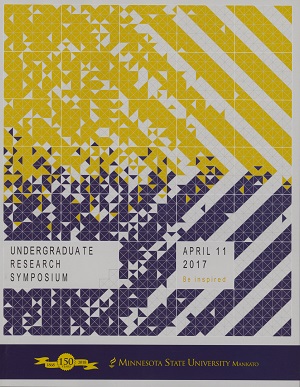Event Title
Helminth Parasites Protect from Intestinal Damage in Mice Model of IBD
Location
CSU Ballroom
Start Date
11-4-2017 10:00 AM
End Date
11-4-2017 11:30 AM
Student's Major
Biological Sciences
Student's College
Science, Engineering and Technology
Mentor's Name
Allison Land
Mentor's Department
Biological Sciences
Mentor's College
Science, Engineering and Technology
Second Mentor's Name
Natalie Gooder
Second Mentor's Department
Biological Sciences
Second Mentor's College
Science, Engineering and Technology
Description
Developed countries have seen a noticeable rise in allergic and autoimmune disease, but interestingly, less developed countries, which have low incidences of allergic and autoimmune disease, have high incidences of parasitic infections. A major part of an immune response is the balance between an inflammatory response and a regulatory response. Once the inflammatory response is triggered, the body induces phagocytes to migrate to the site of the foreign invader. Once at the site, phagocytes are activated and produce cytokines, which activate other cells in the immune system. Once an infection is detected and cytokines are activated, Tregs (regulatory T cells) control which cytokines are used and how. Inflammatory Bowel Disease (IBD) is an example of an autoimmune disease where we see a damaging inflammatory response. I hypothesize that parasites may be used to trick the immune system into shutting off inflammation in IBD. Using a well-established IBD mouse model, heat-killed parasites (or a control) will be fed to the mice. The ability of the parasites to modulate the immune response in IBD will be assessed by measuring IL- 10 (anti-inflammatory) and IFNγ (pro-inflammatory) cytokines using an ELISA. I anticipate that the ability to protect mice from intestinal damage will be shown by an increase in IL-10 (anti-inflammatory) and a decrease in IFNγ (pro-inflammatory). These findings will demonstrate the ability of heat-killed parasites to stimulate an anti-inflammatory immune response, protecting against chronic inflammation. This would provide novel insight into lessening symptoms of IBD and other autoimmune diseases.
Helminth Parasites Protect from Intestinal Damage in Mice Model of IBD
CSU Ballroom
Developed countries have seen a noticeable rise in allergic and autoimmune disease, but interestingly, less developed countries, which have low incidences of allergic and autoimmune disease, have high incidences of parasitic infections. A major part of an immune response is the balance between an inflammatory response and a regulatory response. Once the inflammatory response is triggered, the body induces phagocytes to migrate to the site of the foreign invader. Once at the site, phagocytes are activated and produce cytokines, which activate other cells in the immune system. Once an infection is detected and cytokines are activated, Tregs (regulatory T cells) control which cytokines are used and how. Inflammatory Bowel Disease (IBD) is an example of an autoimmune disease where we see a damaging inflammatory response. I hypothesize that parasites may be used to trick the immune system into shutting off inflammation in IBD. Using a well-established IBD mouse model, heat-killed parasites (or a control) will be fed to the mice. The ability of the parasites to modulate the immune response in IBD will be assessed by measuring IL- 10 (anti-inflammatory) and IFNγ (pro-inflammatory) cytokines using an ELISA. I anticipate that the ability to protect mice from intestinal damage will be shown by an increase in IL-10 (anti-inflammatory) and a decrease in IFNγ (pro-inflammatory). These findings will demonstrate the ability of heat-killed parasites to stimulate an anti-inflammatory immune response, protecting against chronic inflammation. This would provide novel insight into lessening symptoms of IBD and other autoimmune diseases.
Recommended Citation
Helmer, Shannon. "Helminth Parasites Protect from Intestinal Damage in Mice Model of IBD." Undergraduate Research Symposium, Mankato, MN, April 11, 2017.
https://cornerstone.lib.mnsu.edu/urs/2017/poster-session-A/10



